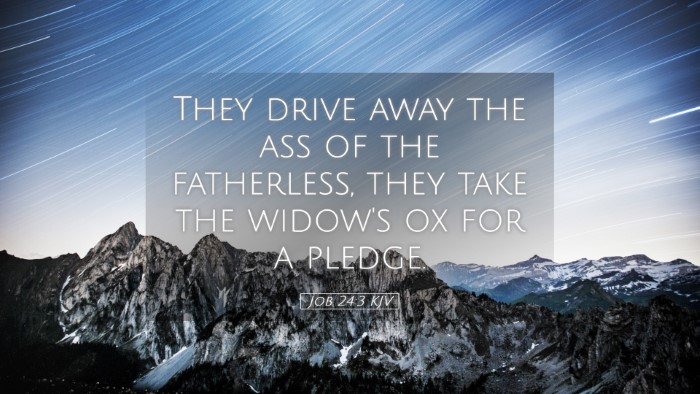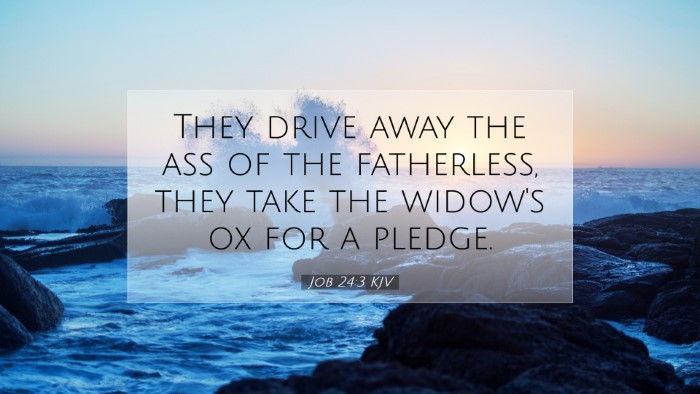Old Testament
Genesis Exodus Leviticus Numbers Deuteronomy Joshua Judges Ruth 1 Samuel 2 Samuel 1 Kings 2 Kings 1 Chronicles 2 Chronicles Ezra Nehemiah Esther Job Psalms Proverbs Ecclesiastes Song of Solomon Isaiah Jeremiah Lamentations Ezekiel Daniel Hosea Joel Amos Obadiah Jonah Micah Nahum Habakkuk Zephaniah Haggai Zechariah MalachiJob 24:3
Job 24:3 KJV
They drive away the ass of the fatherless, they take the widow's ox for a pledge.
Job 24:3 Bible Commentary
Commentary on Job 24:3
Job 24:3 states: "They drive away the donkey of the fatherless; they take the widow's ox for a pledge." This verse offers a profound insight into the injustices faced by the most vulnerable members of society. Below is a summarized commentary drawing from the rich insights of historical biblical scholars such as Matthew Henry, Albert Barnes, and Adam Clarke.
Contextual Overview
In the context of the Book of Job, we encounter a narrative centered on the themes of suffering and divine justice. Job, a man of great piety, experiences profound loss and anguish, leading to a dialogue that wrestles with the reasons behind human suffering and divine governance.
Exegesis of Job 24:3
This verse highlights the exploitation that occurs when those who are weak and powerless, such as the fatherless and widows, are taken advantage of by the wicked. Let us explore some key themes and implications:
- Vulnerability of the Fatherless and Widows: In ancient Near Eastern culture, the fatherless (or orphans) and widows are emblematic of societal vulnerability. They lacked protection and resources, making them prime targets for exploitation.
- Social Injustice: This verse serves as a lamentation over social injustices. The imagery of driving away the donkey and taking the ox represents the active oppression of the needy, illustrating a broader theme of moral corruption in society.
Theological Implications
The actions described in this verse raise questions regarding the nature of divine justice. Why does God allow such acts of injustice to occur? The insights of commentators provide a richer understanding:
- Matthew Henry: Henry emphasizes that God sees the oppressions of the vulnerable, and while it may appear that there are no immediate repercussions for the wicked, divine justice will ultimately prevail. Job's lament articulates the suffering not just of himself but of those who suffer silently.
- Albert Barnes: Barnes notes that the imagery serves as a representation of broader human conditions where the powerful oppress the powerless. He suggests that while it may seem that God is absent during these injustices, His omniscience assures that no sin goes unnoticed.
- Adam Clarke: Clarke brings out the historical context regarding the treatment of orphans and widows as mandated by the Law of Moses. He reflects on the moral expectations placed upon society and highlights that the neglect of such duties reflects a failure to recognize God's commandments.
Moral and Ethical Considerations
The verse serves as a crucial reminder to the people of faith regarding their responsibilities towards the marginalized:
- Advocacy for Justice: Believers are called to advocate for those who cannot defend themselves. The oppression described demands a Christian response that stands against injustice, mirroring the compassion that Jesus exhibited towards the least of these.
- Social Responsibility: The Church has a vital role in addressing social issues. This verse challenges congregations to engage in acts of mercy and to provide support for the fatherless and widows as an expression of their faith.
Conclusion
In summary, Job 24:3 presents a vibrant picture of societal injustice, compelling readers to confront the reality of oppression faced by vulnerable groups. The insights from Matthew Henry, Albert Barnes, and Adam Clarke collectively illuminate the moral and theological mandates woven throughout the Scriptures. This verse, while steeped in the historical context of Job’s suffering, transcends time and echoes a timeless call to justice, compassion, and righteousness.
As we reflect on these truths, may we be inspired to take action in our own contexts and uphold the dignity of every individual, recognizing that in doing so, we fulfill not just our ethical obligations but also the heart of God.


